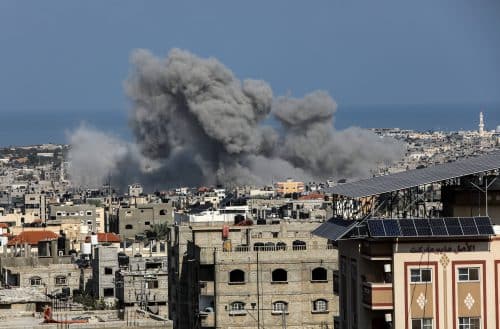The principal architect of the Oslo Accords, Nobel laureate Shimon Peres, warned of the deadly perils entailed in the policy he later embraced.
Quis custodiet ipsos custodes? (Who will guard the guardians themselves) –Roman poet, Juvenal, in Satires (c. AD 100–127)
The recent visit to the Middle East by US President Joe Biden nudged the “Palestinian issue” back toward the focus of international attention, after having been placed decidedly on the back burner during the Trump -Netanyahu era. With this shift of emphasis, the question of the prudence and practicality of significant Israeli withdrawal from land beyond the 1967 “Green Line” will, in all likelihood, assume greater pertinence and prominence than in the recent past,
This is not a matter of minor significance. After all, for almost three decades, since the signing of the 1993 Oslo Accords, the issue that has most divided Israeli society has been that of territorial concessions by Israel to facilitate the establishment of a Palestinian state on the highlands of Judea-Samaria (a.k.a. The West Bank). Indeed, more than any other, it is the question that delineates the rift between Left and Right in the country.
Perhaps one of the most remarkable phenomena in this regard is the astonishing metamorphosis that has taken place in the attitude of prominent politicians, who once rejected the notion of territorial withdrawal and Palestinian statehood as borderline sedition but subsequently embraced it as the centerpiece of Israeli foreign policy and as crucial to the continued survival of Zionism.
A prime example of this is Nobel laureate, Shimon Peres. In a programmatic book he authored, “Tomorrow is Now” (1978), in which he set out his vision for the future of the country, he warned of grave dangers involved in the establishment of a Palestinian state—the cornerstone of the Oslo process he later championed.

Peres on the Perils of a Palestinian state
For example, on page 255, he predicted: “If a Palestinian state is established, it will be armed to the teeth. Within it, there will be bases of the most extreme terrorist forces, who will be equipped with anti-tank and anti-aircraft shoulder-launched rockets that will endanger not only random passers-by, but also every airplane and helicopter taking off in the skies of Israel and every vehicle traveling along the major traffic routes in the coastal plain“.
Ominously he cautioned “It is of course doubtful whether territorial expanse can provide absolute deterrence. However, the lack of minimal territorial expanse places a country in a position of an absolute lack of deterrence. This, in itself, constitutes almost compulsive temptation to attack Israel from all directions …”
Elsewhere (p. 232), he foresaw with chilling accuracy that: “The establishment of such [a Palestinian] state means the inflow of combat-ready Palestinian forces (more than 25,000 men under arms) into Judea and Samaria; this force, together with the local youth, will double itself in a short time. It will not be short of weapons or other [military] equipment, and in a short space of time, an infrastructure for waging war will be set up in Judea, Samaria, and the Gaza Strip. Israel will have problems in preserving day-to-day security”
Even more disturbing is the fact that Peres held these views right up to the year in which the Oslo Accords were signed. Thus in a later book, The New Middle East (1993) he asks trenchantly (p.169): “Even if the Palestinians agree that their state have no army or weapons, who can guarantee that a Palestinian army would not be mustered later to encamp at the gates of Jerusalem and the approaches to the lowlands? And if the Palestinian state would be unarmed, how would it block terrorist acts perpetrated by extremists, fundamentalists, or irredentists?”
How indeed???
Clearly, this is an excellent question — and one that proponents of territorial withdrawal must not be allowed to evade.
Peres on the Strategic Importance of Territory
Peres went on to elaborate on his opposition to territorial concession, detailing the vital military and economic significance of geographical expanse
In the military context he wrote: In 1948, it may have been possible to defend the “thin waist” of Israel’s most densely populated area when the most formidable weapon used by both sides was the canon of limited mobility and limited fire-power…[However,] in the 20th century, with the development of the rapid mobility of armies, the defensive importance of territorial expanse has increased…Without a border that affords security, a country is doomed to destruction in war (pp. 235,254).
On the economic front, Peres was equally foreboding: “The resources available to a country are finite. In the absence of a strategic border, the investment in security that a country requires comes at the expense of other needs. This difference in the level of investment in security creates in certain cases a qualitative change in the general level of a nation – in terms of its economy, its society, and education… A country that has the advantage of a strategic frontier can invest less … in fortifications, maintenance of battle-ready armed forces, armaments…. (p.235)
Peres on the Strategic Importance of Settlements
Peres, in stark opposition to his post-Oslo positions, expressed a firm endorsement of the Jewish communities beyond the 1967 “Green Line”(p.48). In some detail, he articulated the imperative for the initiative: “[We need] to create a continuous stretch of new settlements; to bolster Jerusalem and the surrounding hills, from the north, from the east, and from the south and from the west, by means of the establishment of townships, suburbs and villages – Ma’ale Edumin, Ofra, Gilo, Bet-El, Givon, and IDF camps and Nahal outposts – to ensure that the capital and its flanks are secured, and underpinned by urban and rural settlements.”
As for the Jordan Valley, he asserted: “These settlements will be connected to the coastal plain and Jordan Valley by new lateral axis roads [such as Route #1 & Route #5-MS] the settlements along the Jordan River are intended to establish the Jordan River as the [Israel’s] de facto security border”
As for the communities overlooking Greater Tel Aviv and the urban areas in the coastal plain, he emphasized: “… it is the settlements on the western slopes of the hills of Samaria and Judea which will deliver us from the curse of Israel’s ‘narrow waist’ ”.
And on the Golan Heights, he declared: “the purpose of the settlements in the Golan is to ensure that this territorial platform will no longer constitute a danger, but a barrier against a surprise attack…”
Peres on the Value of Agreements with the Arabs
But perhaps the most disturbing divergence between Peres’s pre- and post-Oslo positions is that which relates to agreements with the Arabs and the store that ought to be placed on them. Indeed, as a recipient of the Nobel Peace Prize for bringing about the Oslo Accords, agreements fraught with deadly dangers, entailing potentially perilous withdrawals from territory that he once designated as crucial for Israel’s security—and entirely dependent on Arab sincerity and goodwill, Peres past pronouncements are particularly jarring. Thus, on p. 255 he wrote:
“The major issue is not [attaining] an agreement but ensuring the actual implementation of the agreement in practice. The number of agreements which the Arabs have violated is no less than the number which they have kept.”
Frequent Arab violations of later agreements can hardly have contributed to a significantly enhanced degree of trust that can be placed in the viability and durability of such agreements, particularly in light of the suspicion Peres himself expressed in his 1993 book “The New Middle East” (see above).
So the troubling question that must inevitably be asked is this: What brought on such a dramatic change in Peres’s position on Palestinian statehood, on the strategic significance of territory/settlements, and on the credence that can be assigned to agreements with Arab partners. This is particularly perplexing given the fact that his original views turned out to be generally well founded, while his revised views proved to be totally unfounded?
This is a very challenging conundrum, with potentially perturbing ramifications. For, the only explanation that accounts for these puzzling developments is that for Peres, his pursuit of personal glory was stronger than his affiliation with the national interest—driving him to pursue policies that, by his own analysis, would “create almost compulsive temptation to attack Israel from all sides” and risk Israel being “doomed to destruction in war“.
Dr. Martin Sherman spent seven years in operational capacities in the Israeli defense establishment, He is the founder of the Israel Institute for Strategic Studies (IISS) and a member of the Habithonistim-Israel Defense & Security Forum (IDSF) research team





